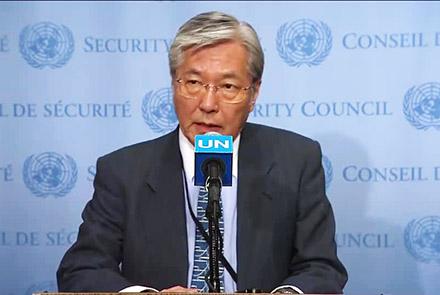Briefing to the United Nations Security Council on Thursday night, the Secretary-General’s Special Representative for Afghanistan, Tadamichi Yamamoto said the most concerning issue relating to the country was that of violence and insecurity.
He said a convincing peace process was needed in order to end the 40 years of conflict, which has left 39 percent of the population under the poverty line, including 3.3 million in acute need of humanitarian aid.
"One year ago in this Council, I called upon all Afghans to come together and find ways to build their own joint future. I also called upon each country of the region to help create an environment conducive to peace in Afghanistan and the region. We must use the upcoming winter months, when conflict levels tend to decrease, to advance on this issue before the cycle of violence is renewed next spring," he said.
He stated that the Kabul Process meeting planned for 1 February offers an opportunity to start a peace process.
He said, at this meeting, the Afghan government is expected to present its strategic concept for reaching a political settlement with the armed opposition, and seek the support of the international community.
"This chance must not be missed. The government and the international partners must focus on how we can reduce the levels of violence next year. We must also seek commencement of a structured dialogue for peace.
"I once again call on the Taliban to express a clear willingness to begin negotiations towards a political settlement, and to start the initial dialogue," he said.
He went on to say that another crucial issue is the holding of parliamentary elections next year, followed by presidential elections in April 2019. "The holding of timely, credible, and accepted elections is indispensable to maintaining the constitutional order and trust in the representative system of government."
However he said he wanted to underline security as a defining factor enabling credible and inclusive elections. "The Afghan government needs to have a thorough security plan for this democratic exercise."
He also said UNAMA will continue its efforts to advance women’s political participation.
Yamamoto said that despite an intense fighting season, recent efforts by Afghan security forces to protect civilians have resulted in reductions in civilian deaths and injuries caused by those forces during ground engagements. "We, however, remain concerned by the continued indiscriminate use of improvised explosive devices by anti-government elements, as well as civilian casualties from air strikes by pro-government forces.
"All in all, the number of civilian casualties remains at the terribly high levels. I continue to receive disturbing reports of child recruitment by armed groups, mainly Daesh and Taliban. I urge the parties to immediately cease this unlawful practice."
On an economic note he said: "We often overlook the impact of Afghanistan’s economy on the society and the conflict. The significant reduction of the international military presence in 2014 led to a collapse in economic growth from 10 per cent to minus 2 per cent.
"This year, Afghanistan is expected to record positive growth for the second year, but not enough to absorb the 400,000 young Afghans who annually seek to join the labour force. At the same time, the illicit economy is expanding, as demonstrated by the massive increase in opium production recorded by UNODC in 2017.
"Narcotics trades are known to be a source of funds for insurgency. We must pay more focused attention to these issues and reinforce our efforts."
He also said this past year has seen important progress on infrastructure development with an eye to connecting Afghanistan to Europe through the Caspian and the Caucasus, and to the Arabian Sea.
These developments demonstrate how Afghanistan’s relationships with its neighbours present opportunities for prosperity, he said.
"But there are also obstacles. I am particularly concerned about recent reports of increased military activities between Afghanistan and Pakistan. UNAMA has recorded some of the suffering caused by such activities on local residents, including civilian casualties, closures of education facilities, and population displacement. I call on the governments of Afghanistan and Pakistan to find ways of collaborating more effectively to address this issue, which affects the populations of both countries."
On a more positive note, Yamamoto said that the achievements in regional cooperation are encouraging but the main dividends of regional cooperation cannot be achieved until there is peace and stability in Afghanistan.
"I do not believe that this sequence can be reversed. In the coming months, there must be significant progress on election preparations, real attempts to reduce violence, and the move towards a credible peace process. Because of the cyclical nature of the conflict, opportunities that are missed in the next three months will in all likelihood be missed for the next year," he said.

